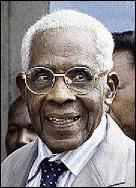
Legendary poet Aimé Césaire, who died at age 94 in April. - Contributed
The Associated Press Paris:
The esteemed Martinique poet and politician Aimé Césaire was a leading figure in the movement for black consciousness.
Césaire died in Fort-de-France on the French Caribbean island of Martinique, on Thursday, April 17, 2008. He was 94.
Césaire was involved in the fight for French West Indian rights, and he also served as a lawmaker in the lower house of France's parliament for nearly 50 years. French President Nicolas Sarkozy successfully led a campaign last year to change the name of Martinique's airport in honour of Césaire.
Free and independent spirit
Sarkozy praised Césaire as "a great poet" and a "great humanist".
"As a free and independent spirit, throughout his whole life, he embodied the fight for the recognition of his identity and the richness of his African roots," Sarkozy said.
"Through his universal call for the respect of human dignity, consciousness and responsibility, he will remain a symbol of hope for all oppressed peoples."
Césaire's 1950
Discourse on Colonialism has become a classic of French political literature and helped develop the concept of negritude, which urges blacks to cultivate pride in their heritage.
Born June 26, 1913, in Basse-Pointe, Martinique, Césaire moved to mainland France for high school and university studies, and finished one of the country's most elite institutes, the Ecole Normale Superieure.
He and Senegal's Leopold Sedar Senghor founded the journal Black Student in the 1930s, which gave birth to the idea of negritude.
Césaire returned to Martinique during World War II and taught at a high school in Fort-de-France.
Césaire served as mayor of Fort-de-France from 1945 to his retirement in 2001, except for a blip in 1983-84.
"I accomplished the work I had to do," Césaire said in his surprise announcement in 2000 that he wouldn't seek another mayoral term.
Césaire's essays included Negro I am, Negro I Will Remain. His poems, written in French, included 'Notes From a Return to the Native Land'. He also wrote plays.

